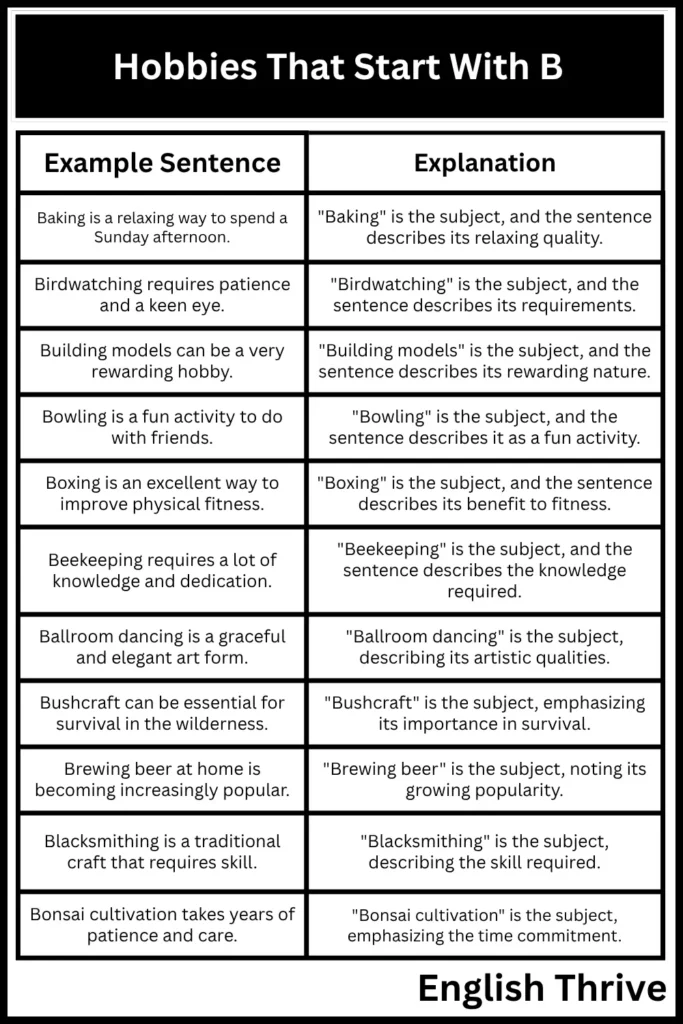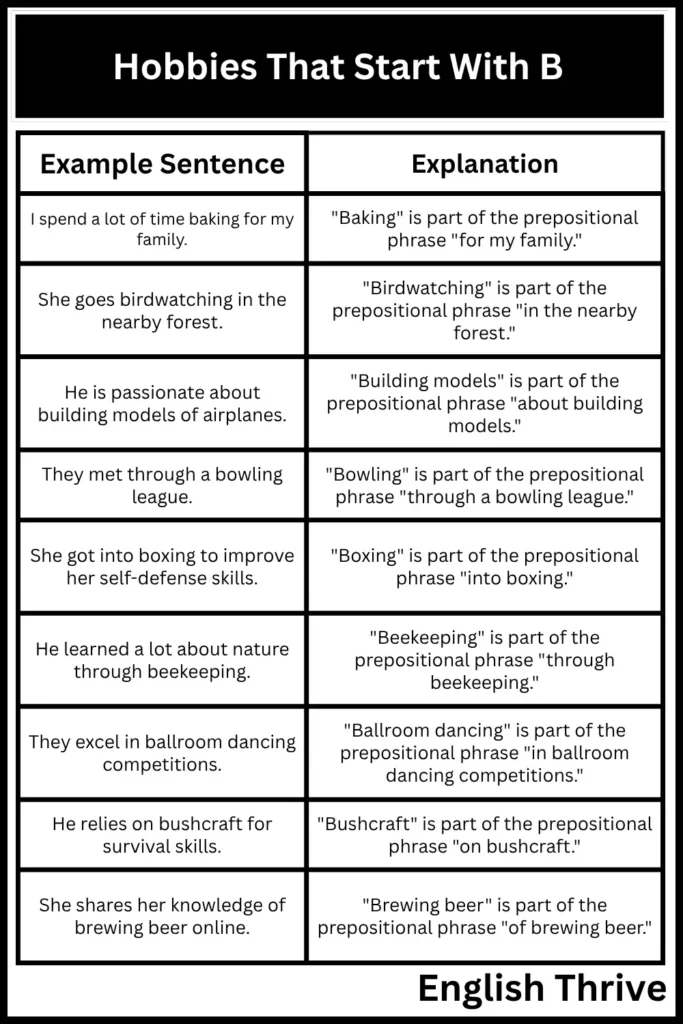Hobbies can help you learn English in a simple and fun way. They teach new words and help you use grammar in real sentences. When you study hobbies that start with B, learning feels simple and focused. These hobbies give you clear examples to build strong grammar skills.
You can be new to English or more advanced. This guide will still help you speak and write with more confidence.
Contents
ToggleWhat Are Hobbies That Start With B?
A hobby is something you do for fun in your free time. When we focus on hobbies that start with B, we get a short, helpful list that makes grammar practice simple and direct.
Here are common hobbies that start with B, organized by category:
Creative Hobbies That Start With B
Baking
Baking lets you make bread, cakes, and other treats.
Beadwork
Beadwork uses beads to create art or jewelry.
Basket Weaving
Basket weaving is a calm craft with many styles.
Batik
Batik uses wax and dye to make patterns on cloth.
Physical Hobbies That Start With B
Bowling
Bowling is a fun group activity.
Boxing
Boxing builds strength and sharp reflexes.
Badminton
Badminton helps you stay fast and active.
Bodybuilding
Bodybuilding builds strong muscle through training.
Thinking and Intellectual Hobbies
Book Collecting
Book collecting lets you find rare or special books.
Botany
Botany is the study of plants.
Brain Training
Brain training helps improve memory and focus.
Puzzle Building
Puzzles train your mind to solve problems.
Outdoor Hobbies That Start With B
Birdwatching
Birdwatching needs patience and excellent observation skills.
Bushcraft
Bushcraft teaches outdoor survival skills.
Boating
Boating is calm, peaceful, and scenic.
Backpacking
Backpacking mixes hiking and camping.
Social Hobbies That Start With B
Bingo
Bingo brings groups together in a fun way.
Ballroom Dancing
Ballroom dancing builds grace and confidence.
Board Games
Board games bring friends together for excitement and competition.
How to Use Hobbies in Sentences
Talking about hobbies is a wonderful way to learn simple sentence structure.
A basic sentence includes:
- Subject – the person
- Verb – the action
- Object – the hobby (often ending in -ing)
- Extra details—time, place, or reason
Subjects in Sentences
- Baking is relaxing.
- Birdwatching needs patience.
Objects in Sentences
- I enjoy baking.
- She loves birdwatching.
Hobbies in Prepositional Phrases
- She spends hours baking for her family.
- He is skilled at bushcraft.
Examples of Simple Sentences
- I enjoy baking.
- They go bowling every week.
Examples of Complex Sentences
- Because it relaxes me, I enjoy baking on weekends.
Grammar Rules for Talking About Hobbies
Gerunds vs. Infinitives
Use “-ing” after verbs like “enjoy,” “like,” and “love.”
- I enjoy baking.
Use “to” and a verb after want, need, and plan.
- I want to try birdwatching.
Article Usage With Hobbies
- No article for general hobbies: Boxing is a famous exercise.
- A/An: For one example, baking is a creative outlet.
- For something specific: The baking I did yesterday was for a fundraiser.
Adjectives and Adverbs
Use adjectives to describe the hobby:
- creative baking
- tough boxing
Use adverbs to describe how you do it:
- He carefully practices basket weaving.
Practice Exercises
Exercise 1—Verb Tenses
Fill in the correct tense.
Example:
I ___ baking since I was a child. → I have enjoyed
Exercise 2—Article Usage
Fill in the correct article.
Exercise 3—Gerunds and Infinitives
Choose the correct form.
FAQs About Hobbies That Start With B
What is the difference between a hobby and an interest?
A hobby is something you do. An interest is something you like.
When Should I Use Gerunds vs. Infinitives?
Use “-ing” after “enjoy,” “like,” and “love.”
Use “to” and a verb after want, need, or hope.
How Can I Add More Detail When Describing My Hobby?
Use adjectives, adverbs, and simple phrases like “with friends” or “on weekends.”
What Are Common Phrases for Talking About Hobbies?
“I’m interested in…”
“I enjoy…”
“I’m into…”
“I spend my free time…”
How Can I Correct Someone Politely If They Make a Grammar Mistake?
You can gently correct her by saying, “Maybe you could also use the phrase ‘I enjoy baking.'”
Can I Use Hobbies as a Topic in English Conversation Practice?
Yes! Hobbies are helpful for simple, natural conversations.
How Can I Find a Language Partner Who Shares My Hobbies?
Use hobby groups, clubs, or language exchange sites.
Conclusion
Hobbies that start with B offer a pleasurable way to learn grammar. They give you clear words, simple examples, and many ways to practice English. Continue learning and exploring new hobbies, and enjoy each step as your English continues to grow.



